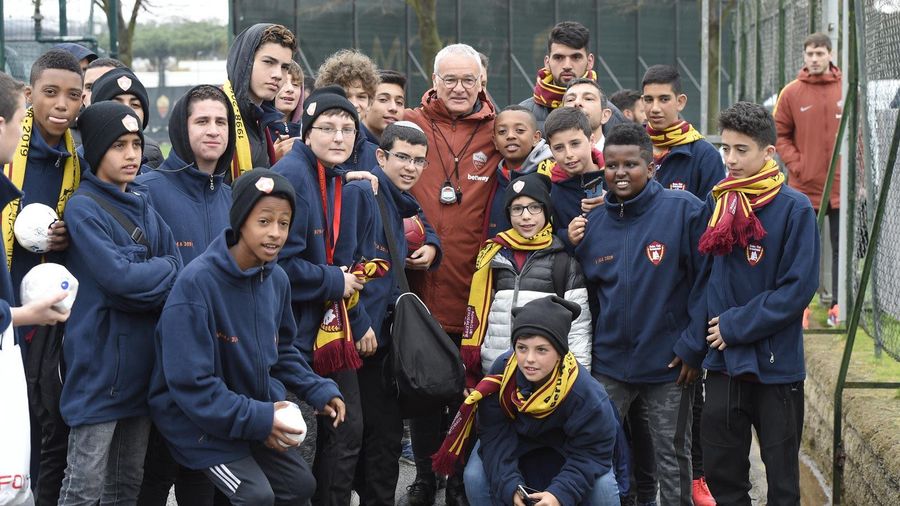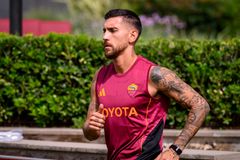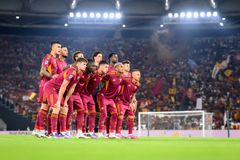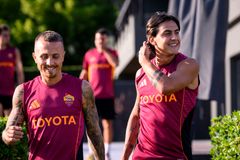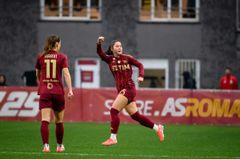

Earlier this month, members of Roma Club Jerusalem were special guests of the club in the Italian capital – as children from the club’s football academy had the chance to visit both the Stadio Olimpico and Roma's Trigoria training centre, and meet some of the heroes they had previously only seen on television.
Roma Club Jerusalem (or Roma Club Gerusalemme, to give its official name) has a long and storied history in Israel and, to celebrate its recent 20th anniversary, the club organised a special trip to Rome for 30 of its students – a trip that, while focused on football and centered around a visit to the Stadio Olimpico to watch Roma’s game against Fiorentina, was also seen as an opportunity to educate the children on a variety of modern issues.
A club that started out as a place for a handful of Italian expats in the city to come together and watch the team they supported has blossomed into something of a beacon in the region, bringing players from all backgrounds, religions and races together.
“Football is the means to get to these kids and to reach them in a different way,” says Samuele Giannetti, vice-president and secretary of Roma Club Jerusalem.
"Football can teach and educate. First of all we are educators. That is the most important thing for us. To build a new generation that will be better for society, and for each other.”
We recently spoke to Giannetti at length, to learn more about the origins of Roma Club Jerusalem, the good work it does now in a city with citizens from all religions and races – and their plans for the future.
First of all, Samuele, can you explain a little bit about how Roma Club Jerusalem was founded?
“It all started in the late 1990s. Back in those days there was no wi-fi, there was limited internet, there was not much access to news about Roma or indeed any Italian football. Myself, along with Fabio [Sonnino, founder of the club], Daniel [Di Veroli] and Fabrizio [Di Segni] were in Israel, but we all had strong links with Rome and AS Roma and wanted to find a way to share our passion.
“The club was officially founded on 17 November 1998 – we had a big party at the Jazz Cafe on Piazza Navona in the days after Roma played Juventus [on November 15]. Vincent Candela and Paulo Sergio scored that day and the Giallorossi won 2-0. We had arranged to have a party in Rome, to celebrate the opening of the first supporters club outside the country, and invited 400 people.
"In the end, because of the excitement after the win over Juve, 600 people turned up - including Candela himself and Marco Delvecchio!”
Can you tell us a bit more about Fabio, the president?
“Fabio is in a wheelchair. He has cerebral palsy, due to a brief lack of oxygen to the brain when he was born. Initially he could walk, with the aid of crutches or a walker, but over time the wheelchair became the only way to get around.
"But he has always been a huge motivation for me. Because he cannot do as much, it takes a lot of time for him to do things. But he would talk to me about when he was in Rome, how he would take a train alone to Milan to go and watch Milan-Roma. And that was not easy for someone like him. The commitment, the personal strength to do that is the best example I could offer of the man.
"It made me understand his passion, and what he was prepared to do for Roma and the club he loves. Not long after the club was founded, we were invited on ESPN in Israel, because they were broadcasting the derby with Lazio. That game finished 3-3 [Roma came from behind to draw, ending a terrible run of form in the derby] and when Francesco Totti scored the equaliser Fabio could not contain himself and wiped all the microphones off the table during his celebrations!
"But does not need any help to lead a normal life, and would be angry with me if I ever seemed to express any pity or concern for his situation. Obviously I try to help him, but equally he helps me a lot. He has really inspired me, and what I do now and what we work on is undoubtedly motivated by his passion.”
In the beginning it must have been quite a small group…
“So back then we would literally get on the phone and invite people to Fabio’s place to watch the games. We basically made a club to follow Roma. And this idea would start to grow. And then, after a while, we decided to organise tournaments under this group: matches with the Italian consulate, with the policeman who worked in the consulate, and other groups we began to know – Jews, Christians, whomever. It was something very open, very good.
“After a year or so of that, I asked, ‘Why don’t we start to do something nice with the children?’ And in 2008 we started the academy with seven kids - and year after year it would get bigger and bigger.”
How did it grow?
“Word of mouth really – the message would spread, parents would hear about it, and after about five years we had over 150 kids playing with us. Unfortunately we cannot train more kids than that right now. It’s very difficult to do everything when so many of us are volunteers, but equally there are also coaches and pitches and insurance and equipment that needs to be paid for.
"There are a lot of expenses and it’s not so simple. But year after year from the start there would be more kids in the group.”
What sort of kids come to the club?
“These are kids from all different backgrounds. They are not from just one quarter of Jerusalem, but every single quarter. So we have Jews, we have Muslims, we have Christians; we have kids from almost every background. And boys and girls, of course.
"Our students range from five years old to 14 years old. We don’t look at the colour of the skin, the religion, the background, and we try to educate them along those lines.
“We tell the kids, from all parts, that they will always feel included. Our motto is inclusion. We try to talk to them in all languages, and a lot of kids want to come to play with us because they hear about that. But unfortunately these days I have to turn away a lot of kids, because there are no more places. But we can help improve society in this way, and our Roma club can play a key role in that.”
What is the ethos of the club?
“Well, we’ve learned a lot from doing this over the years, from coaching so many kids. How to educate them as players but also as people. Violence, for example. We have a strict no-violence policy. It is forbidden to be violent – but not just physically, but verbally as well. You cannot insult others. Because if you start with verbal violence then you eventually get to physical violence. So we stop that before it can even be started.
“We tell them when they arrive, ‘Okay, if you want to be here there are two rules you must follow’. The first is respect. Respect for the coaches, respect for the other kids, respect for your friends. And the second is no violence of any kind.
“And we try to teach them in small things too. For example, the kids all have to carry the bags to and from the pitch, and line them up correctly there too. Which is not necessarily part of the normal mentality here. But the kids learn that such things are expected from them, and they get used to doing it. And that builds into their character. It puts order on the pitch, and order in their mind. And they learn something about themselves. It’s not always simple, but we want to do that along with the football. So we do.”
Are the kids used to mixing with other kids from different backgrounds like that?
“Some of them, but not all of them. And we make sure the kids socialise outside of football training as well. Every month we organise something different. They might go out to eat together, at a different restaurant, or go to the cinema to watch a film as a group. So they start to meet outside of football as well. And we have coaches that can speak in different languages. They often have to translate stuff at the same time for different kids. But we really want every kid to feel like they are at home.”
Is it difficult, bringing together kids from so many different backgrounds?
“Over time, we actually found the kids would start to educate their parents. Because at the start we would find the intolerance would come from the parents – ‘He doesn’t want to play with him’, ‘They don’t want to play with her’ and so on – but the kids would say to the parents, ‘No, we want to play’ or ‘We don’t care’.
"It doesn’t matter where they come from, who they are, or anything like this. And we started to pursue this programme to constantly push inclusion and acceptance. And I think now we have a good basis to grow this group to another level.”
“Over time, we actually found the kids would start to educate their parents. Because at the start we would find the intolerance would come from the parents – ‘He doesn’t want to play with him’, ‘They don’t want to play with her’ and so on – but the kids would say to the parents, ‘No, we want to play’ or ‘We don’t care’.
- Samuele Giannetti
What is the next level?
“Right now we are, let’s say, half-professional. We have a good team, we have good coaches. We make sure our coaches do the development courses whenever they can, but to take the next step we need more. Last year we won the championship in Jerusalem for the Under-13 and Under-14 age groups, which I think we can do again this year. So we have a good group, and a successful project.
"But after 10 years, now perhaps is the time to do something even more important.
“Sadly the level of Israeli soccer is not very good generally. But there are so many children, so many kids who want to learn and improve, and there are so many parents that are thirsty for their kids to learn more and get as good as they can be so now is the time to address that. Our name in Jerusalem, and really throughout Israel, is very well-known. We are respected, we have won trophies, and we have a lot of kids learning more than just about football.”
What is the level of talent like in Israel?
“I spoke to the coach of Belgium Under-21 girls recently and he said that Israel is a lot like Belgium, in that it is not a big country but there is a lot of interest in football, a lot of passion, and a lot of kids that can be taught. It just requires the infrastructure. But we can also teach them more than just about football. The kids arrive from very different backgrounds and experiences.
"I will give you an example: I was in Rome one month ago with the kids. And these kids did not know so much: they didn’t know they had to take their passport, for example. They didn’t know anything about boarding an airplane, going through an airport, or things like that. So we had to explain all that.
“The football, in a way, is the way we can connect them with all these other important life skills and experiences. Soccer can teach and educate. First of all we are educators. That is the most important thing for us. To build a new generation that will be better for society, and for each other.”
What was the trip to Rome like?
“Thirty kids came on the trip last month. It is not simple to organise, believe me! I started to organise it in August last year. Every time we come, I always have to plan everything to the last degree. There is Plan A, and then there is always Plan B.
"Where we are staying, how we are travelling... it is always very difficult. And we have to be careful, from a security point of view as well. Because a group like ours, with people from every race and creed and religion playing and learning together, perhaps it can be a target for those who don’t agree with that message. So we have to be very careful.
"So it is a lot of work, but in the end I think all the kids come home absolutely amazed, so happy and thankful. They take thousands of photos, they make memories they never forget.”
It sounds like football is a key part of the trip, but not necessarily the focus…
“When we were in Rome we took the Muslim kids to the mosques, we took the Jewish kids to the synagogues, we took the Christians to the Vatican. But we took all the other kids with them to all of those too.
"I said to them all, at every place, ‘Go in!’. Because it is something very different – for the Jews that live here in Israel they cannot go into a mosque, for example, and that’s true for the Muslims going into synagogues and so on. That is because of security, because of the tensions and everything else. But in Rome, everything is open. So I tell the kids to go in, because it’s a chance for them to experience something different, to open their mind and learn more about life.
“And this transfers to the pitch as well, because if you open your mind off the pitch you can open it on the pitch as well. And the inclusion helps you play like a team. Because the team is always stronger than the individual. And that’s what I explain to the kids. Not only in soccer, but in life, that the team, the group will always achieve more than an individual can.”
But the kids must have been excited about going to the Olimpico, about visiting Trigoria…
“For sure, for them perhaps the football is more exciting because they know about the Olimpico and they really know all the players! But at the same time, I wanted people to speak with them in another type of way. To explain the history and the culture of the city. So many kids don’t know about the Colosseum, what it really is, and we have to explain that to them. Like with the airport and airplanes, we have to explain how the Colosseum appeared and what it was for and everything else.
“But for us, it is not only about soccer. All this is important too. Football is the means to get to these kids out there and to reach them in a different way, to explain other things to them as well. When major national teams are in Israel, like the Italy Under-21s a few years ago, we try to take the kids to see them. So they can learn about the team but also the culture. Step-by-step, we try to do that.”
How is the club financed?
“We say to the parents, there is a price for the year for the kids to play. But we know if a family cannot pay, then we are not going to kick them out. This whole project is based on donations, and the hard work of a lot of volunteers too. We always try to find donations to cover the costs for the kids. We do not take donations from political organisations, or from the state, or from different organised religions, or the government department for sport. We always want to stay out of that.
“So we only take private donations, from people all around the country and even further afield, who believe in the project and what we are trying to do. So I speak with the families of the kids and, if they want to play, then we will find a way even if for some reason they become unable to pay. The price right now is about 2000 shekels a year (roughly 500 euros), which covers training twice a week and the games and the equipment and kit they need. That’s not a lot. I know that other clubs will charge maybe twice or three times that. But this is our project.
“We started with very small numbers, with seven kids, and now we have 150. And the parents know that their kids will get the chance to go to Rome, to see the Colosseum, to see the Olimpico. And that is an incredible opportunity. For a lot of them, being where they are from, it’s not an opportunity they could ever expect to get.”
Has the club made Roma more popular in Israel?
“Roma is very popular here too now, of course. And especially last year, after reaching the semi-finals [of the Champions League] and after beating Barcelona, there was a huge amount of interest in the club. Here a lot of the media companies call me when Roma does something, to speak to them about Roma. Because they know our club very well and what we have done here.”
Have any of the kids been good enough to pursue careers in the game?
“We had two very talented kids, that we tried to bring to Italy actually. Not Rome, but in Italy. But the issue was the visas. With an Israeli passport you cannot enter for longer than three months. We had found them a family to stay with, a school where they could study in Hebrew and Italian. These were kids, 14 years old, that were going to go away from their families for four or five months into a completely different environment. But we managed to find everything they needed to be settled, but unfortunately right now with the visa it is very difficult.
“It’s easier with the kids who have a European passport, but this is another reason why we are looking to take the next step, as perhaps then we can continue to train players beyond 14 – to 16, 17, 18 years old – and also to find them other opportunities abroad. Because the potential is here. The potential is unbelievable.”

 Tickets
Tickets
 Shop
Shop

















